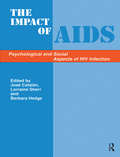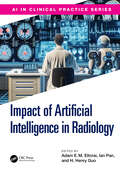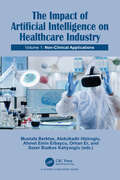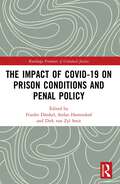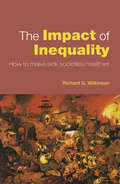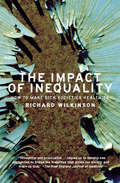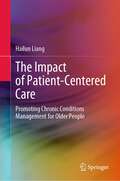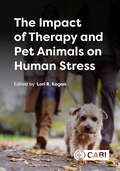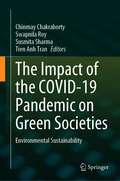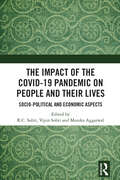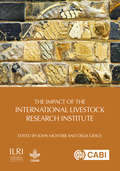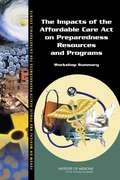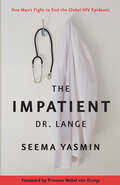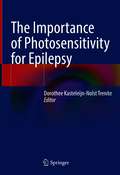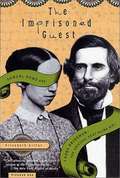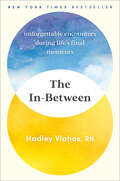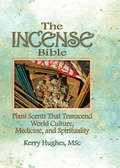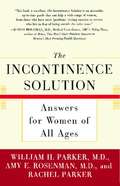- Table View
- List View
The Impact of Aids: Psychological and Social Aspects of HIV Infection
by José Catalán; Lorraine Sherr; Barbara HedgeFirst Published in 1997. From the start of the HIV epidemic, the psychological and social aspects of the AIDS infection have been recognized. This volume contains a selection of key contributions to the discussion on the psychological and social implications of such infection.
The Impact of Artificial Intelligence in Radiology (AI in Clinical Practice)
by Adam E. M. Eltorai, Ian Pan, and H. Henry GuoImplementation of artificial intelligence (AI) in radiology is an important topic of discussion. Advances in AI—which encompass machine learning, artificial neural networks, and deep learning—are increasingly being applied to diagnostic imaging. While some posit radiologists are irreplaceable, certain AI proponents have proposed to "stop training radiologists now." By compiling perspectives from experts from various backgrounds, this book explores the current state of AI efforts in radiology along with the clinical, financial, technological, and societal perspectives on the role and expected impact of AI in radiology.
The Impact of Artificial Intelligence on Healthcare Industry: Volume 1: Non-Clinical Applications
by Sezer Bozkus Kahyaoglu Mustafa Berktas Abdulkadir Hiziroglu Ahmet Emin Erbaycu Orhan ErHealthcare and medical science are inherently dependent on technological advances and innovations for improved care. In recent times we have witnessed a new drive in implementing these advances and innovations through the use of Artificial Intelligence, in both clinical and non-clinical areas.The set of 2 volumes aims to make available the latest research and applications to all, and to present the current state of clinical and non-clinical applications in the health sector and areas open to development, as well as to provide recommendations to policymakers. This volume covers non-clinical applications. The chapters covered in this book have been written by professionals who are experts in the healthcare sector and have academic experience.
The Impact of Climate Change and Bioenergy on Nutrition
by Brian Thompson Marc J CohenClimate changes will affect food production in a number of ways. Crop yields, aquatic populations and forest productivity will decline, invasive insect and plant species will proliferate and desertification, soil salinization and water stress will increase. Each of these impacts will decrease food and nutrition security, primarily by reducing access to and availability of food, and also by increasing the risk of infectious disease. Although increased biofuel demand has the potential to increase incomes among producers, it can also negatively affect food and nutrition security. Land used for cultivating food crops may be diverted to biofuel production, creating food shortages and raising prices. Accelerations in unregulated or poorly regulated foreign direct investment, deforestation and unsustainable use of chemical fertilizers may also result. Biofuel production may reduce women's control of resources, which may in turn reduce the quality of household diets. Each of these effects increases risk of poor food and nutrition security, either through decreased physical availability of food, decreased purchasing power, or increased risk of disease. The Impact of Climate Change and Bioenergy on Nutrition articulates the links between current environmental issues and food and nutrition security. It provides a unique collection of nutrition statistics, climate change projections, biofuel scenarios and food security information under one cover which will be of interest to policymakers, academia, agronomists, food and nutrition security planners, programme implementers, health workers and all those concerned about the current challenges of climate change, energy production, hunger and malnutrition.
The Impact of Climate Change on Fungal Diseases (Fungal Biology)
by María Guadalupe Frías-De-León Carolina Brunner-Mendoza María del Rocío Reyes-Montes Esperanza Duarte-EscalanteThe shift of weather patterns has affected the incidence and prevalence of infectious diseases, including mycoses. Mycoses have remained neglected due to a lack of training and recognition within the medical community. Nonetheless, these diseases remain common worldwide while frequently being underdiagnosed. Climate change affects the distribution of fungal communities, provoking outbreaks in locations where these mycoses were absent or in low frequencies. Moreover, the reports of clinical cases related to new fungal pathogens have increased due to the description of new fungal species or due to the ability of some species to shift to new hosts. Thus, this book, The Impact of Climate Change on Fungal Diseases, is a contribution to the knowledge of a global environmental phenomenon and its relation to these diseases, and it serves as a guide for health professionals to dive deep into the repercussions of climate change and how they can implement measures for the prevention and control of fungal infections.
The Impact of Covid-19 on Prison Conditions and Penal Policy (Routledge Frontiers of Criminal Justice)
by Frieder DünkelThe Impact of COVID-19 on Prison Conditions and Penal Policy presents the results of a worldwide exchange of information on the impact of COVID-19 in prisons. It also focuses on the human rights questions that have been raised during the pandemic, relating to the treatment of prisoners in institutions for both juveniles and adults worldwide. The first part brings together the findings and conclusions of leading prison academics and practitioners, presenting national reports with information on the prison system, prison population rates, how COVID-19 was and is managed in prisons, and its impact on living conditions inside prisons and on reintegration programmes. Forty-four countries are covered – many in Europe, but also Argentina, Brazil, Chile, Colombia, Perú, Costa Rica, Canada, the USA, Kenya, South Africa, China, India, Japan, Australia and New Zealand. In the second part, thematic chapters concentrate explicitly on the impact of the pandemic on the application of international human rights standards in prisons and on worldwide prison population rates. The book concludes by drawing out the commonalities and diverging practices between jurisdictions, discussing the impact of measures introduced and reflecting on what could be learnt from policies that emerged during the pandemic. Particular attention is paid to whether "reductionist" strategies that emerged during the pandemic can be used to counteract mass incarceration and prison overcrowding in the future. Although the book reflects the situation until mid 2021, after the second and during the third wave of the pandemic, it is highly relevant to the current situation, as the living conditions in prisons did not change significantly during the following waves, which showed high infection rates (in particular in the general population), but increased vaccination rates, too. In prisons, problems the pandemic raises have an even greater impact than for the general society. Revealing many notable and interesting changes in prison life and in release programmes, this book is essential reading for students and scholars of penology, criminology, law, sociology and public health. It will also appeal to criminal justice practitioners and policy makers.
The Impact of Food Bioactives on Health
by Kitty Verhoeckx Paul Cotter Iván López-Expósito Charlotte Kleiveland Tor Lea Alan Mackie Teresa Requena Dominika Swiatecka Harry Wichers"Infogest" (Improving Health Properties of Food by Sharing our Knowledge on the Digestive Process) is an EU COST action/network in the domain of Food and Agriculture that will last for 4 years from April 4, 2011. Infogest aims at building an open international network of institutes undertaking multidisciplinary basic research on food digestion gathering scientists from different origins (food scientists, gut physiologists, nutritionists. . . ). The network gathers 70 partners from academia, corresponding to a total of 29 countries. The three main scientific goals are: Identify the beneficial food components released in the gut during digestion; Support the effect of beneficial food components on human health; Promote harmonization of currently used digestion models Infogest meetings highlighted the need for a publication that would provide researchers with an insight into the advantages and disadvantages associated with the use of respective in vitro and ex vivo assays to evaluate the effects of foods and food bioactives on health. Such assays are particularly important in situations where a large number of foods/bioactives need to be screened rapidly and in a cost effective manner in order to ultimately identify lead foods/bioactives that can be the subject of in vivo assays. The book is an asset to researchers wishing to study the health benefits of their foods and food bioactives of interest and highlights which in vitro/ex vivo assays are of greatest relevance to their goals, what sort of outputs/data can be generated and, as noted above, highlight the strengths and weaknesses of the various assays. It is also an important resource for undergraduate students in the 'food and health' arena.
The Impact of Inequality: How to Make Sick Societies Healthier
by Richard G. WilkinsonIn this book, pioneering social epidemiologist Richard Wilkinson, shows how inequality affects social relations and well-being. In wealthy countries, health is not simply a matter of material circumstances and access to health care; it is also how your relationships and social standing make you feel about life.Using detailed evidence from rich market democracies, the book addresses people’s experience of inequality and presents a radical theory of the psychosocial impact of class stratification. The book demonstrates how poor health, high rates of violence and low levels of social capital all reflect the stresses of inequality and explains the pervasive sense that, despite material success, our societies are sometimes social failures. What emerges is a new conception of what it means to say that we are social beings and of how the social structure penetrates our personal lives and relationships.
The Impact of Inequality: How to Make Sick Societies Healthier
by Richard G. WilkinsonIn this book, pioneering social epidemiologist Richard Wilkinson, shows how inequality affects social relations and well-being. In wealthy countries, health is not simply a matter of material circumstances and access to health care; it is also how your relationships and social standing make you feel about life.Using detailed evidence from rich market democracies, the book addresses people’s experience of inequality and presents a radical theory of the psychosocial impact of class stratification. The book demonstrates how poor health, high rates of violence and low levels of social capital all reflect the stresses of inequality and explains the pervasive sense that, despite material success, our societies are sometimes social failures. What emerges is a new conception of what it means to say that we are social beings and of how the social structure penetrates our personal lives and relationships.
The Impact of Inequality: How to Make Sick Societies Healthier
by Richard WilkinsonA &“powerful and provocative&” inquiry into the relationship between societies&’ inequality and their citizens&’ health, happiness and well-being (Lisa Berkman, Harvard School of Public Health). Comparing the United States with other market democracies, and one American state with another, this book presents irrefutable evidence that inequality is a driver of poor health, social conflict, and violence. Pioneering social scientist Richard Wilkinson addresses the growing feeling—so common in the United States—that modern societies, despite their material success, are social failures. The Impact of Inequality explains why inequality has such devastating effects on the quality and length of our lives. Wilkinson shows that inequality leads to stress, which in turn creates sickness on the individual and mass level. As a consequence, society suffers widespread unhappiness and high levels of violence, depression, and mistrust across the social spectrum. With persuasive evidence and fascinating analysis, the diagnosis is clear: Social and political equality are essential to improving life for everyone. Wilkinson argues that even small reductions in inequality can make an important difference—for, as this book explains, social relations are always built on material foundations. &“This new book, a wonderful work of synthesis, brings insight into how conditions of society impact on people&’s daily lives. . . . It is a stimulating and exciting book.&” —Sir Michael Marmot, author of The Status Syndrome
The Impact of Mindfulness Meditation Programs on Performance-Related Outcomes: Implications for the U.S. Army
by Karen Chan Osilla Kimberly A. Hepner Erika Litvin Bloom Sydne Newberry Jessica L. Sousa Marika Booth Armenda Bialas Carolyn M. RutterThis report presents results from a systematic review and meta-analyses of research examining how mindfulness meditation affects 13 performance-related outcomes of interest to the U.S. Army and broader military. The authors supplemented the systematic review by examining how mindfulness meditation could support stress management and exploring characteristics of selected mindfulness programs.
The Impact of Patient-Centered Care: Promoting Chronic Conditions Management for Older People
by Hailun LiangThis book investigates the impact of patient-centered care (PCC) for older adults with chronic conditions and presents new evidence concerning its effects on the care process and health outcomes. The book highlights the impact of PCC on elderly chronic disease patients’ health experiences and demonstrates that PCC is associated with better performance in delivering care to this group of patients. The PCC approach also provides opportunities for improving the delivery of cancer care, although patient-centered oncology care is still in its infancy and evidence on its effectiveness is scant. The book also includes a systemic review and meta-analysis of connections between PCC and cancer patients’ adverse healthcare utilization, costs, patient satisfaction, and quality of care. This book is unique in terms of the measures’ comprehensiveness and provides ample evidence that the implementation of PCC is associated with better healthcare performance. The intended readers include researchers in related fields, graduate students, and healthcare providers. It is hoped the book offers further evidence for meaningful practice and have many policy and research implications in PCC.
The Impact of Therapy and Pet Animals on Human Stress
by Paul J. Zak A. Alexander Beaujean Jeffrey R. Stevens John-Tyler Binfet Roger N. Reeb Brianne Donaldson David M. Feldman Aliya Khalid Abigail Alfrey Ariann E. Robino Alyssa N. Stein Melody A. Schmaltz Hailey A. Fitzpatrick Jaime L. Tartar Frankie Pizzo Marah Friedman Olivia Feldman Rafael Martos-Montes David Ordóñez-Pérez Jesús Ruiz-Maatallah Miriam Martínez-Cobos Elise R. Thayer Jonathan B. Banks Caitlin McCoy Courtney Trzcinski Nicole L. Beasley Greg C. Elvers Hannah L. Torok Patricia Pendry Alexa M. Carr Stephanie M. Roeter Jaymie L. Vandagriff Saadia Dildar Benjamin A. Curry Moana Vercoe Matthew Filippo Karen Manville Mark Coulson Michele A. Mulqueen Kirsty Neller Caroline Searing Sarah Welland Gemma Reynolds Freya L.L. Green Rebecca J.P. Godard Madisyn M. Szypula Camille X. Rousseau Jordy Decker Beth A. Lanning Amelia L. Wilson Robert Woelk Lauren Highfill Miranda Goodman-Wilson Mónica Teresa González-Ramírez René Landero-Hernández Minerva Vanegas-FarfanoStress can have a deleterious effect on people's mental, physical, and psychological health. There is a growing body of evidence, however, that suggests animals, both as pets and therapy partners, can help mitigate people's stress levels. This book showcases a rich collection of research papers from Human-Animal Interactions. It highlights research pertaining to pets as well as animal-assisted therapy in both school and professional settings. The book also includes a scene-setting introduction and wrap-up conclusion from the editor. Providing comprehensive information on the impact of animals on human stress, this book is a useful resource for anyone interested in human health or human-animal relationships.
The Impact of Welfare Reform: Balancing Safety Nets and Behavior Modification
by Michael Sullivan Christopher R. LarrisonGet a balanced, comprehensive analysis of the effects from 1996 welfare reformThe Personal Responsibility and Work Opportunity Reconciliation Act of 1996 was aimed at repairing the welfare system of the United States. The Impact of Welfare Reform: Balancing Safety Nets and Behavior Modification comprehensively examines how this bill transformed the system and affected not only clients but also the organizations that implemented the reform. This text moves beyond traditional analyses of welfare reform to reveal a full range of viewpoints and issues while avoiding mere political rhetoric. Leading authorities present knowledgeable perspectives on the clients and their problems, the implementing organizations, the struggles to comply with the requirements, and the issues that remain unresolved.The Impact of Welfare Reform presents revealing interviews with clients, organizational employees, and caseworkers. In-depth discussion topics include the value of emotional well-being on job status, the effects that the new time limit requirements have on clients, ways to facilitate the welfare-to-work transition for women with mental health issues, changes in the work environment of service-providing organizations, and the client&’s own experiences within and outside of the system. Qualitative and quantitative methods of study are used to effectively evaluate welfare reform while providing a direction for further research in the future. The text is extensively referenced and uses tables, charts, and figures to clearly illustrate data.This book will bring you up to date on: the impact of alcohol, drugs, and psychological well-being on successfully finding employment the impact of welfare reform on children and adolescents innovations by state welfare offices community and alternative interventions that help those on Temporary Assistance for Needy Families (TANF) to comply with work requirements and time limits the perceptions of caseworkers who implement TANF and the Personal Responsibility and Work Opportunity Reconciliation Act (PRWORA)The Impact of Welfare Reform is enlightening reading for social workers, educators, graduate students, and public policy professionals.
The Impact of the COVID-19 Pandemic on Green Societies: Environmental Sustainability
by Chinmay Chakraborty Swapnila Roy Susmita Sharma Tien Anh TranThis book covers the sustainability issues of a green environment towards economics and society in terms of alteration in industrial pollution levels, effect of reduced carbon emissions, changes in water bodies characteristics with respect to heavy metal contamination, monitoring of associated impact with respect to ecology and biodiversity, impact of reduced noise levels and air quality influences on human health, handling and management of biomedical waste. According to WHO, 80% of people living in urban areas are exposed to air exceeding safe limits. The advent of "sustainability‟ in development science has led planners to apply evolving notions of "sustainability‟ to the contemporary debate over how cities and regions should be revitalized, redeveloped, and reformed. Market allocation of resources, sustained levels of growth and consumption, an assumption that natural resources are unlimited and a belief that economic growth will „trickle down‟ to the poor have been its hallmarks. The recent advance technology helps to promote green and clean modern societies continuously. The Internet of things will be playing an important role in the upcoming years in environment protection and sustainable development. There is a focus on paradigm shift in the sustainable development for the green environment during the period of isolation of COVID-19. This is the moment for the mobilization against the climate crisis. The sudden fall in pollutants and subsequent blue skies signifies a dramatic shift for India and also other affected countries during this period. Fighting climate change requires a collaborative approach between all spheres of society unlike the former. It must heavily redirect resources towards local, sustainable activities, including education, health, sustainable agriculture and circular management of resources. The impact of COVID-19 pandemic which has resulted in the dramatic change in the different aspects of the environment. The global lockdown has led to a rejuvenation of nature, ecosystems, biodiversity. Even urban environments are discovering a degree of peace and serenity, which led to decrease in greenhouse gas emission.
The Impact of the Covid-19 Pandemic on People and their Lives: Socio-Political and Economic Aspects
by R. C. Sobti Monika Aggarwal Vipin SobtiThis book explores the unparalleled adversities and strain that the COVID-19 pandemic caused on the social and economic lives of people. The book allows readers a glimpse into the experiences of death of near and dears, loss of livelihood, psychological trauma, restrictions on movement and social life, shifts in international relations, and effects on big and small industries caused by the pandvnemic. It focusses on the major shifts caused within communities and highlights how politics, power dynamics, and socio-cultural systems have been reset and recovered during recent times. The volume also offers suggestions to offset economic hardships the pandemic has caused especially to the poor and marginalized as well as policy changes to help governments and communities to build more resilient economic and health infrastructure and support systems. With interdisciplinary contributions, this book is an essential read for students and researchers of public health, social sciences, health economics, healthcare management, development studies, public policy, and South Asian studies.
The Impact of the International Livestock Research Institute
by Delia Grace John McIntireProviding the first evidenced-based global estimates of the many scientific, economic, policy, and capacity development impacts of livestock research in and for developing countries. This volume is an indispensable guide and reference for veterinarians, animal and forage scientists, and anyone working for the equitable and sustainable development of the world's poorer agricultural economies. Livestock is one the fastest growing agricultural sectors, with most growth occurring in developing countries. For more than four and a half decades one global centre has been mandated to conduct research on leveraging the benefits and mitigating the costs of livestock production in poor countries. This book focuses on the achievements and impacts of the International Livestock Research Institute (ILRI) and its predecessors, the International Livestock Centre for Africa (ILCA) and the International Laboratory for Research on Animal Diseases (ILRAD). The scientific and economic impacts of tropical livestock research detailed in this work reveal valuable lessons for reducing world hunger, poverty and environmental degradation. Describing the impacts of smallholder livestock systems on the global environment, the book also covers animal genetics, production, health and disease control, and livestock-related land management, public policy, and economics, all with useful pointers for future livestock-for-development research.
The Impacts of the Affordable Care Act on Preparedness Resources and Programs: Workshop Summary
by Megan ReeveMany of the elements of the Affordable Care Act (ACA) went into effect in 2014, and with the establishment of many new rules and regulations, there will continue to be significant changes to the United States health care system. It is not clear what impact these changes will have on medical and public health preparedness programs around the country. Although there has been tremendous progress since 2005 and Hurricane Katrina, there is still a long way to go to ensure the health security of the Country. There is a commonly held notion that preparedness is separate and distinct from everyday operations, and that it only affects emergency departments. But time and time again, catastrophic events challenge the entire health care system, from acute care and emergency medical services down to the public health and community clinic level, and the lack of preparedness of one part of the system places preventable stress on other components. The implementation of the ACA provides the opportunity to consider how to incorporate preparedness into all aspects of the health care system. "The Impacts of the Affordable Care Act on Preparedness Resources and Programs" is the summary of a workshop convened by the Institute of Medicine's Forum on Medical and Public Health Preparedness for Catastrophic Events in November 2013 to discuss how changes to the health system as a result of the ACA might impact medical and public health preparedness programs across the nation. This report discusses challenges and benefits of the Affordable Care Act to disaster preparedness and response efforts around the country and considers how changes to payment and reimbursement models will present opportunities and challenges to strengthen disaster preparedness and response capacities.
The Impatient Dr. Lange: One Man's Fight to End the Global HIV Epidemic
by Seema YasminThe incredible story of Joep Lange’s life and his unrelenting quest to end the HIV epidemic.When Malaysia Airlines flight MH17 was shot down by pro-Russian rebels in July 2014, the world wondered if a cure for HIV had fallen from the sky and disappeared among the burning debris. Seated in the plane’s business-class cabin was Joseph Lange, better known as Joep, a shrewd Dutch doctor who had revolutionized the world of HIV and AIDS and was working on a cure. Dr. Lange graduated from medical school in 1981, right as a new plague swept across the globe. His story became intertwined with the story of HIV. At once a physician, scientist, AIDS activist, and medical diplomat, Lange studied ways to battle HIV and prevent its spread from mother to child. Fighting the injustices of poverty, Lange advocated for better access to health care for the poor and the vulnerable. He championed the drug cocktail that finally helped rein in the disease and was a vocal proponent of prophylactic treatment for those most at risk of contracting HIV. The Impatient Dr. Lange is the story of one man’s struggle against a global pandemic—and the tragic attack that may have slowed down the search for a cure. Seema Yasmin charts the course of the HIV epidemic and Dr. Lange's career as a young doctor who blazed his own path and dedicated his life to HIV. Yasmin draws on written records, medical journals, recorded discussions, expert testimony, and extensive interviews with Lange’s family, friends, and colleagues around the globe—including the people he spoke to in the days before he died. She faithfully reconstructs key scenes from Lange’s life and the history of the AIDS epidemic, revealing how Lange became a global leader in the fight against AIDS. The first book about Lange and his contributions to the fight against HIV, The Impatient Dr. Lange is a powerful tribute to one of the greatest scientists, activists, humanitarians, and social entrepreneurs in the world of HIV/AIDS.
The Impatient Dr. Lange: One Man's Fight to End the Global HIV Epidemic
by Seema YasminA powerful tribute to one of the greatest scientists, activists, humanitarians, and social entrepreneurs in the world of HIV/AIDS.When Malaysia Airlines flight MH17 was shot down by pro-Russian rebels in July 2014, the world wondered if a cure for HIV had disappeared. Seated in the plane’s business-class cabin was Joseph Lange, better known as Joep, a shrewd Dutch doctor who had revolutionized the world of HIV and AIDS and was working on a cure.Dr. Lange graduated from medical school in 1981, right as a new plague swept across the globe. He studied ways to battle HIV and prevent its spread from mother to child. Fighting the injustices of poverty, Lange advocated for better access to health care for the poor and the vulnerable. He championed the drug cocktail that finally helped rein in the disease and was a vocal proponent of prophylactic treatment for those most at risk of contracting HIV.The Impatient Dr. Lange is the story of one man’s struggle against a global pandemic—and the tragic attack that may have slowed down the search for a cure. Seema Yasmin draws on written records, medical journals, recorded discussions, expert testimony, and extensive interviews with Lange’s family, friends, and colleagues around the globe—including the people he spoke to in the days before he died. She faithfully reconstructs key scenes from Lange’s life and the history of the AIDS epidemic, revealing how Lange became a global leader in the fight against AIDS.“A thrilling history of the investigation of one of the greatest plagues in human history.” —Lawrence Wright, Pulitzer Prize-winning author
The Importance of Photosensitivity for Epilepsy
by Dorothee Kasteleijn-Nolst TreniteThis book offers a detailed account of all aspects of photosensitive epilepsy, including genetic testing, functional imaging (fMRI, MEG), pharmacological studies, animal studies, classification based on the occurrence of photoparoxysmal responses (PPRs) in different epilepsy syndromes, and the available prevention and treatment options. In addition, the comorbidity of and overlap between migraine and epilepsy are discussed. Informative case histories with EEG examples and a helpful glossary are included. In epilepsy, the term photosensitivity is used both for epileptic seizures triggered by flashing or flickering light and for epileptiform discharges evoked by intermittent photic stimulation (IPS) during an EEG recording. Most patients with a clear history of visually induced seizures will show epileptiform EEG discharges during IPS (PPRs). As epileptiform discharges can be evoked in photosensitive patients at any time, without triggering seizures, they can be considered a useful surrogate marker of the necessity and efficacy of epilepsy treatment. This book will serve as an ideal guide to the subject for pediatricians, (pediatric) neurologists, epileptologists, (child) psychiatrists, clinical geneticists, neuropsychologists, neuropharmacologists, occupational therapists, and basic scientists.
The Imprisoned Guest: Samuel Howe and Laura Bridgman, the Original Deaf-Blind Girl
by Elisabeth GitterDid you ever wonder what inspired Helen Keller's mother to have such high hopes for her daughter? The answer is Laura Bridgman, the original deaf-blind girl who inspired Charles Darwin to visit her and also write about her in American Notes.
The In-Between: Unforgettable Encounters During Life's Final Moments
by Hadley VlahosPassionate advocate for end-of-life care and TikTok star Hadley Vlahos shares moving stories of joy, wisdom, and redemption from her patients’ final moments in this “brilliant” (Zibby Owens, Good Morning America) memoir. <p><p> Talking about death and dying is considered taboo in polite company, and even in the medical field. Our ideas about dying are confusing at best: Will our memories flash before our eyes? Regrets consume our thoughts? Does a bright light appear at the end of a tunnel? For most people, it will be a slower process, one eased with preparedness, good humor, and a bit of faith. At the forefront of changing attitudes around palliative care is hospice nurse Hadley Vlahos, who shows that end-of-life care can teach us just as much about how to live as it does about how we die. <p><p> Vlahos was raised in a strict religious household, but began questioning her beliefs in high school after the sudden death of a friend. When she got pregnant at nineteen, she was shunned by her community and enrolled herself in nursing school to be able to support herself and her baby. But nursing soon became more than a job: when she focused on palliative care and hospice work, it became a calling. <p><p> In The In-Between, Vlahos recounts the most impactful experiences she’s had with the people she’s worked with—from the woman who never once questioned her faith until she was close to death, to the older man seeing visions of his late daughter, to the young patient who laments that she spent too much of her short life worrying about what others thought of her—while also sharing her own fascinating journey. <p><p> Written with profound insight, humility, and respect, The In-Between is a heartrending memoir that shows how caring for others can transform a life while also offering wisdom and comfort for those dealing with loss and providing inspiration for how to live now. <p> <b>New York Times Bestseller</b>
The Incense Bible: Plant Scents That Transcend World Culture, Medicine, and Spirituality
by Dennis J Mckenna Kerry HughesMake a spiritual connection to nature with real, raw, natural incenseThe Incense Bible is a comprehensive guide to the spiritual meaning of real, raw, natural incense and how to use it in prayer, meditation, or simply in creating a home environment to "reconnect" with divinity and nature. This unique book examines the spiritual and ritual uses of "pure" incense (not sticks, cones, or synthetic mixtures), explores our attraction to it, and explains how we can use it at home to increase wellness. Filled with easy-to-use references and easy-to-understand technical information, the book also looks at the use of incense in health and medicine, a history of its use in a variety of countries and cultures, and various types of raw incense, including eucalyptus, sandalwood, sweet grass, agarwood, frankincense, and myrrh.The Incense Bible examines aspects of spirituality and religion, health and medicine, botanical medicines, ethnobotany, and history of real incense-not the low-quality, processed, synthetic fragrances most people think of as "incense." This enlightening and entertaining book, written in everyday language and filled with photgraphs, examines why incense appeals to our sense of smell, of adventure, and of spiritual and physical well-being-and has for centuries. The book looks at the use of incense for purifications and cleansings, creative inspiration, meditation, worship and prayer, for inducing dreams and sleep, to improve learning and problem solving, and as a perfume for clothes, hair, and body.Topics examined in The Incense Bible include: types of raw incense, including balsam, cedar, mugwort and moxa, and white sage safety how the sense of smell works the link between taste and scent scent and memory allergies and sensitivities oils and flower essences for healing how to make incense incense materials and symbols the use of incense in Egyptian, Greek, and Roman times, in Buddhism and Shamanism, in Israel, in the Catholic Church, in Native American sweat lodges, and in the African rainforest and much more!The Incense Bible is an essential resource for anyone interested in health and natural medicine, botanical medicines, and ethnobotany, and for anyone seeking to express their spirituality by reconnecting to nature
The Incontinence Solution
by William Parker Rachel Parker Amy RosenmanMillions of women experience difficulties controlling their bladders but suffer in silence, reluctant to speak to their doctors -- or even to their best friends -- about the problem. Here, at last, women will find the most up-to-date medical explanations and state-of-the-art solutions, including:Controversial links between current childbirthing practices -- like episiotomy, the use of forceps, and long labor -- and the development of incontinence later in life. Advanced diagnostic tests that enable women to quickly find the most effective treatment. Nonsurgical treatments: pelvic muscle exercises and oral medications that really work. Surgical options featuring new minimally invasive outpatient procedures.
